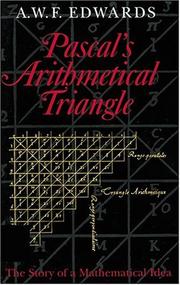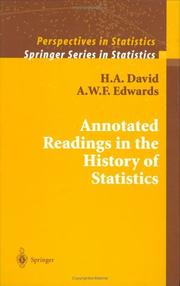| Listing 1 - 9 of 9 |
Sort by
|
Book
ISBN: 0521213258 9780521213257 Year: 1977 Publisher: Cambridge Cambridge University Press
Abstract | Keywords | Export | Availability | Bookmark
 Loading...
Loading...Choose an application
- Reference Manager
- EndNote
- RefWorks (Direct export to RefWorks)
Biomathematics. Biometry. Biostatistics --- Genetics --- Population genetics --- Mathematical models --- Génétique quantitative --- Quantitative genetics --- Mathématique --- mathematics --- Basic Sciences. Genetics --- Mathematical models. --- Population and Quantitative Genetics --- Population and Quantitative Genetics. --- Population genetics - Mathematical models --- Genetique quantitative --- Biomathematique --- Genetique
Book
ISBN: 0521082994 9780521082990 Year: 1976 Publisher: Cambridge Cambridge University Press
Abstract | Keywords | Export | Availability | Bookmark
 Loading...
Loading...Choose an application
- Reference Manager
- EndNote
- RefWorks (Direct export to RefWorks)
Dr Edwards' stimulating and provocative book advances the thesis that the appropriate axiomatic basis for inductive inference is not that of probability, with its addition axiom, but rather likelihood - the concept introduced by Fisher as a measure of relative support amongst different hypotheses. Starting from the simplest considerations and assuming no more than a modest acquaintance with probability theory, the author sets out to reconstruct nothing less than a consistent theory of statistical inference in science.
Mathematical statistics --- Probabilities --- Science --- Statistique mathématique --- Probabilités --- Sciences --- Statistical methods --- Méthodes statistiques --- Methodology --- 519.2 --- 519.226 --- Probability --- Statistical inference --- Combinations --- Mathematics --- Chance --- Least squares --- Risk --- Statistics, Mathematical --- Statistics --- Sampling (Statistics) --- Probability. Mathematical statistics --- Inference and decision theory. Likelihood. Bayesian theory. Fiducial probability --- Mathematical statistics. --- Probabilities. --- Statistical methods. --- 519.226 Inference and decision theory. Likelihood. Bayesian theory. Fiducial probability --- 519.2 Probability. Mathematical statistics --- Statistique mathématique --- Probabilités --- Méthodes statistiques --- -#SBIB:303H521 --- Methoden sociale wetenschappen: waarschijnlijkheid --- Science - Methodology --- Science - Statistical methods --- Statistique mathématique.
Book
ISBN: 0852642830 Year: 1987 Publisher: London Charles Griffin & Company
Abstract | Keywords | Export | Availability | Bookmark
 Loading...
Loading...Choose an application
- Reference Manager
- EndNote
- RefWorks (Direct export to RefWorks)

ISBN: 9780801869464 Year: 2002 Publisher: (London) The Johns Hopkins University Press
Abstract | Keywords | Export | Availability | Bookmark
 Loading...
Loading...Choose an application
- Reference Manager
- EndNote
- RefWorks (Direct export to RefWorks)

ISBN: 0521318718 Year: 1984 Publisher: Cambridge Cambridge University press
Abstract | Keywords | Export | Availability | Bookmark
 Loading...
Loading...Choose an application
- Reference Manager
- EndNote
- RefWorks (Direct export to RefWorks)

ISBN: 0387988440 1441931740 1475735006 9780387988443 Year: 2001 Publisher: New York Springer
Abstract | Keywords | Export | Availability | Bookmark
 Loading...
Loading...Choose an application
- Reference Manager
- EndNote
- RefWorks (Direct export to RefWorks)
This book provides a selection of pioneering papers or extracts ranging from Pascal (1654) to R.A. Fisher (1930). The authors' annotations put the articles in perspective for the modern reader. A special feature of the book is the large number of translations, nearly all made by the authors. The selected articles vary considerably in difficulty, some requiring only a basic understanding of statistical concepts, whereas others surprise by their early sophistication in "classical" statistics.There are several reasons for studying the history of statistics: intrinsic interest in how the field of statistics developed, learning from often brilliant ideas and not reinventing the wheel, and livening up general courses in statistics by reference to important contributors.Herbert A. David is Distinguished Professor Emeritus in the Department of Statistics, Iowa State University and served as Department Head from 1972 to 184. He was Editor of Biometric from 1967 to 1972 and President of Biometric Society for 1982-1983. His publications include books on Order Statistics (Wiley 1970, 1981) and The Method of Paired Comparisons (Griffin 1963, 1988). Apart from articles in these two areas he has written on statistical inference, experimental designs, competing risks, and the history of statistics. He received a Ph.D. in statistics from University College London in 1953.A.W.F. Edwards is Reader in Biometry in the University of Cambridge. He was President of the British Region of the Biometric Society in 1992-1994 and is Chairman of the Christiaan Huygens Committee for the History of Statistics of the International Statistical Institute. His publications include the books Likelihood (Cambridge University Press 1972, Johns Hopkins University Press 1992), Foundations of Mathematical Genetics (Cambridge University Press 1977, 2000), and Pascal's Arithmetical Triangle (Griffin 1987). He holds the degrees of Ph.D. and Sc.D. from Cambridge University.
Mathematical statistics --- History --- History. --- Probabilities. --- Statistics . --- Probability Theory and Stochastic Processes. --- Statistical Theory and Methods. --- Statistics, general. --- Statistical analysis --- Statistical data --- Statistical methods --- Statistical science --- Mathematics --- Econometrics --- Probability --- Statistical inference --- Combinations --- Chance --- Least squares --- Risk --- Mathematical statistics - History
Book
ISBN: 1108613985 1316276252 1108605125 9781108605120 9781316276259 9781107111721 1107111722 9781107529366 Year: 2018 Publisher: Cambridge : Cambridge University Press,
Abstract | Keywords | Export | Availability | Bookmark
 Loading...
Loading...Choose an application
- Reference Manager
- EndNote
- RefWorks (Direct export to RefWorks)
A. W. F. Edwards is one of the most influential mathematical geneticists in the history of the discipline. One of the last students of R. A. Fisher, Edwards pioneered the statistical analysis of phylogeny in collaboration with L. L. Cavalli-Sforza, and helped establish Fisher's concept of likelihood as a standard of statistical and scientific inference. In this book, edited by philosopher of science Rasmus Grønfeldt Winther, Edwards's key papers are assembled alongside commentaries by leading scientists, discussing Edwards's influence on their own research and on thinking in their field overall. In an extensive interview with Winther, Edwards offers his thoughts on his contributions, their legacy, and the context in which they emerged. This book is a resource both for anyone interested in the history and philosophy of genetics, statistics, and science, and for scientists seeking to develop new algorithmic and statistical methods for understanding the genetic relationships between and among species both extant and extinct.
Population genetics --- Genetics --- Cladistic analysis. --- Mathematical models. --- Edwards, A. W. F. --- Cladism --- Cladistic method --- Cladistic taxonomy --- Cladistics --- Cladograms --- Phylogenetic systematics --- Phylogenetic taxonomy --- Taxonomy, Cladistic --- Taxonomy, Phylogenetic --- Biology --- Branching processes --- Phylogeny --- Biomathematics --- Classification --- Edwards, Anthony William Fairbank,
Book
Abstract | Keywords | Export | Availability | Bookmark
 Loading...
Loading...Choose an application
- Reference Manager
- EndNote
- RefWorks (Direct export to RefWorks)
Book
ISBN: 0822959860 Year: 2008 Publisher: University of Pittsburgh Press
Abstract | Keywords | Export | Availability | Bookmark
 Loading...
Loading...Choose an application
- Reference Manager
- EndNote
- RefWorks (Direct export to RefWorks)
In 1865, Gregor Mendel presented "Experiments in Plant-Hybridization," the results of his eight-year study of the principles of inheritance through experimentation with pea plants. Overlooked in its day, Mendel's work would later become the foundation of modern genetics. Did his pioneering research follow the rigors of real scientific inquiry, or was Mendel's data too good to be true-the product of doctored statistics?In Ending the Mendel-Fisher Controversy, leading experts present their conclusions on the legendary controversy surrounding the challenge to Mendel's findings by British statistician and biologist R. A. Fisher. In his 1936 paper "Has Mendel's Work Been Rediscovered?" Fisher suggested that Mendel's data could have been falsified in order to support his expectations. Fisher attributed the falsification to an unknown assistant of Mendel's. At the time, Fisher's criticism did not receive wide attention. Yet beginning in 1964, about the time of the centenary of Mendel's paper, scholars began to publicly discuss whether Fisher had successfully proven that Mendel's data was falsified. Since that time, numerous articles, letters, and comments have been published on the controversy.This self-contained volume includes everything the reader will need to know about the subject: an overview of the controversy; the original papers of Mendel and Fisher; four of the most important papers on the debate; and new updates, by the authors, of the latter four papers. Taken together, the authors contend, these voices argue for an end to the controversy-making this book the definitive last word on the subject.
Mendel, Gregor, 1822-1884 --- Genetics --- Hybridization, Vegetable --- History, Modern --- Hybridization --- Science --- History
| Listing 1 - 9 of 9 |
Sort by
|

 Search
Search Feedback
Feedback About UniCat
About UniCat  Help
Help News
News